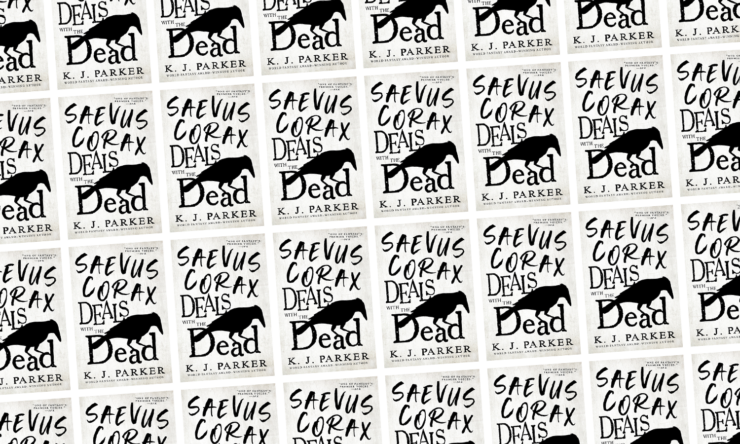K. J. Parker, the prolific pseudonym of British comic novelist Tom Holt, is one of the most enjoyable fantasists working today, provided you have a taste for the sardonic, a dislike for the sentimental, and an unhealthy skepticism about human nature. His latest novel, Saevus Corax Deals with the Dead, may not be his most ambitious, but it offers substantial entertainment.
In The Devil’s Dictionary, Ambrose Bierce defined a cynic as “A blackguard whose faulty vision sees things as they are, not as they ought to be.” In his play Lady Windermere’s Fan, Oscar Wilde has Lord Darlington opine that a cynic is a “man who knows the price of everything and the value of nothing.” In K.J. Parker’s novels, the cynics have inherited the earth. There are occasional non-cynical characters in Parker’s novels, but they tend to have bit roles. And while they may walk on confidently, they rarely exit the scene on their own power. More often than not, the hapless innocents and luckless idealists are quickly stabbed, bludgeoned, or otherwise dispatched, then discreetly dragged offstage.
Buy the Book


Saevus Corax Deals With the Dead
Saevus Corax (not his given name) might not know the price of everything, but he’s an adept judge of military hardware. Corax, which I remind all the non-Classicists is Latin for “raven,” leads a company of battlefield salvagers. Like his namesake bird, Corax swoops down to the battlefield after hostilities have ceased. He and his men strip corpses of clothes and armor, retrieve and refletch used arrows, collect swords and spears, and finally tidy up the place by burning the bodies. They also tend to the wounded. It’s not humanitarian so much as pragmatic: Life may be cheap in Corax’s world, but the various armies will still pay good money to have a soldier back on their feet and back in the fray.
Corax is a tad sensitive about his real identity: In the first chapter of the novel, he fatally poisons an injured soldier who was unfortunate enough to know who the salvager used to be and stupid enough to trumpet the fact. Without delving too deep into the plot, Corax’s real identity is eventually discovered, and he is forced to travel to Sirupat, the geopolitical flashpoint of his world. Although the island has few inhabitants, little arable land, and less culture, it’s also the source of much of the world’s gold. Multiple nations, backed by two rival banks, are converging on the island, and Corax manufactures ploy after desperate ploy in an attempt to stave off a world-wide war.
Although Corax personally believes that “a convincing lie improves on bleak, bare fact,” in his capacity as narrator, he is scrupulously honest about his general lack of scruples. Running from his past invariably lands Corax in physical peril and moral jeopardy. He reflects that “a good man would have reached the point where he stopped running, held his hands up and offered his throat to the knife,” but Corax is a man of few illusions and could never label himself good.
All this might sound grim, and it occasionally is, but Parker’s wry tone and mordant humor ensure that Saveus’s adventures are never dreary. I laughed, I winced, and I read on. Parker’s world resembles ours in several ways; it’s clear that the vanished Robur Empire, for example, dominated Corax’s continent the way the Roman Empire ruled Europe, and their language was, more or less, Latin. So it’s perhaps less jarring than you might expect to encounter one of Parker’s “Earthisms.” Here is the narrator’s sometime friend Ekkehard on the importance of appealing to emotion:
“Oh, yes. Cheering and stamping and death before slavery, the whole nine yards. Where you always go wrong is trying to persuade people with facts and arguments. It’s why you can only write comedy. What gets people going is stuff that doesn’t mean shit but sounds great. Blood, toil, tears and sweat. I have a dream. Drain the swamp. Yes, we can. It’s the sound of the words and the cadences. You never managed to get that right.”
The next paragraph has what I take to be a Billy Wilder joke, and similar references are studded throughout. These asides may break some readers’ immersion; others, like me, will have a chuckle and continue blithely on. Parker can be serious indeed when he wants to be, but he’s never self-serious.
By the bloated standards of fantasy in 2023, this book, just 350 pages, almost qualifies as a novella. I’m all for concision, but I did wish that Parker had devoted a little more time to his secondary characters. Only two really stand out: Ekkehard, a blowhard actor and serial betrayer, and Stauracia, a fellow rogue who seems destined to be Saevus’s great love, his greatest enemy, or both. Other characters, from the functionaries of Sipurat to Corax’s grotesque fellow salvagers, one of whom collects pickled relics of dead warriors, are more props than they are people. Similarly, although Parker is famous for his detailed account of how things work, from markets to metallurgy to fencing, a few dramatic naval engagements in which outnumbered forces achieve stunning victories are sped through and unconvincingly glossed over. But these are small quibbles and, as Corax points out, “nobody’s perfect.”
Although Saevus Corax Deals with the Dead has a perfectly satisfying ending, it’s the first book in a trilogy. Our itinerant arms dealer’s adventures continue next month with Saevus Corax Conquers the Castle and conclude in December with Saevus Corax Gets Away with Murder. I look forward to reading the rest of his tale. Sometimes cynics are the best company.
Saevus Corax Deals With the Dead is published by Orbit.
Matt Keeley reads too much and watches too many movies. You can find him on Twitter at @mattkeeley.










